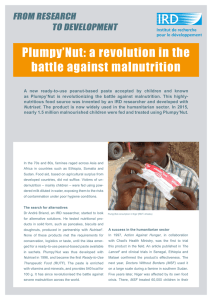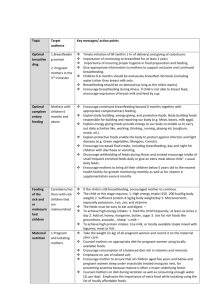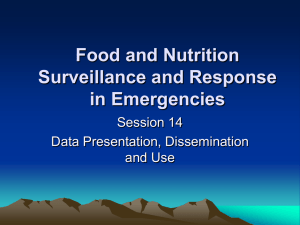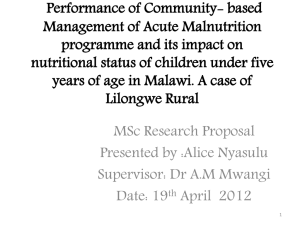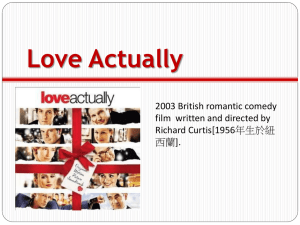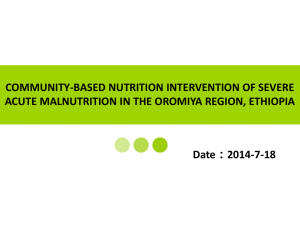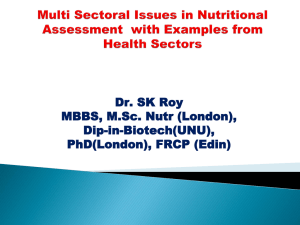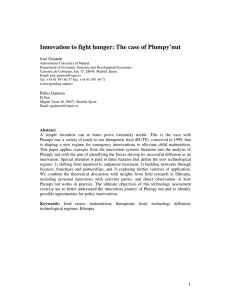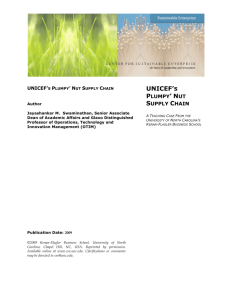Dr.Vandana Prasad - the international baby food action network
advertisement
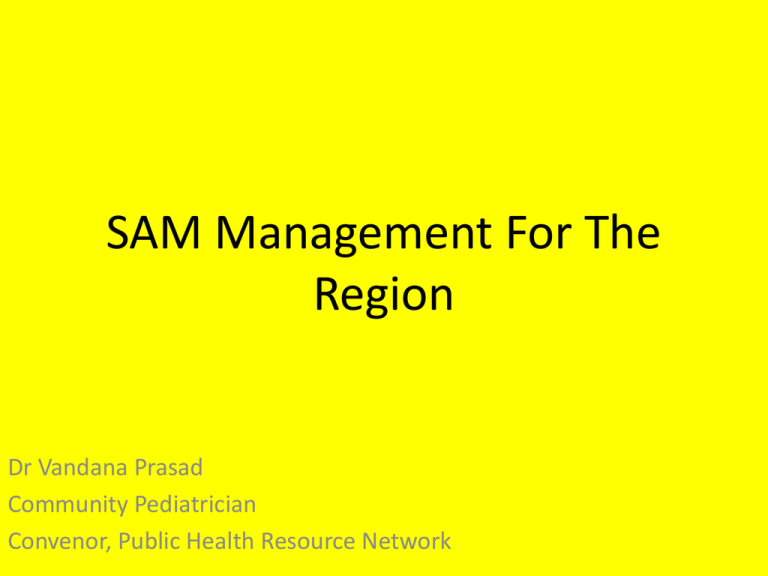
SAM Management For The Region Dr Vandana Prasad Community Pediatrician Convenor, Public Health Resource Network Guiding Principles • SAM is the tip of the iceberg • Downstream interventions need to be housed in comprehensive strategies for food security and prevention • No strategy should compromise local livelihoods or overall food security • Strategies should be sustainable for costs, supply chain efficiency etc (supply side issues) • Community ownership and maximal possible decentralisation will take care of most of the points above including governance issues such as corruption. Specific Programmatic Design • Overall Care – sensitised, trained, adequately supported / remunerated human power (2nd anganwadi worker, nutritional counselling), facilities for care (day care) • Health Care – as above (ASHA), facility based services such as NRCs • Nutritional Care – high calory density food based on locally produced and processed food – family produced, women’s groups produced, CDC produced etc • Micronutrient supplementation through food diversity and the national supplementation programme Process and Product • Larger economic and social frameworks – poverty and gender • Decentralising and community empowering process PROCESS MORE IMPORTANT THAN PRODUCT FOR LONG TERM AND SUSTAINABLE GAINS UNFORTUNATELY ENTIRE FOCUS ON PRODUCT; A CENTRALISED, PATENTED, OFTEN IMPORTED, OFTEN ALIEN TO FOOD CULTURE, INORDINATELY EXPENSIVE, PRIVATELY PRODUCED; CERTAINLY FAR BEYOND COMMUNITY CONTROL Commercial RUTF (cRUTF) What We Are Told About cRUTF • Energy dense food with added minerals and vitamins • Required for short term management of SAM (about about 68 weeks) • Community use • Safe • Ad lib adminstration • Sterile • Waterless • Rigorous quality control (WHO standards) for vitamin and minerals • Cannot be manufactured in a decentralized way to be able to meet standards and to fulfill need for packaging to make sterile and waterless The Food Drug Confusion food drug safe √ X ad lib √ X stringent quality control X √ exclusively for children with SAM X √ only for short duration X √ Can be used without strict supervision √ X End Result Use freely and distribute as food but manufacture as drug. Universalised market, monopolised production ‘only for SAM’ and ‘only for brief period’ is not consistent with the statement above, probably added to overcome resistance, enlist support and accommodate critics (watch this space…) Other Concerns • Process of introduction • Lack of required research on alternatives (single product advocacy • Confusion in entry-exit criteria; at any point, two children with identical weight, age and muac may getting different management because one enters through SAM and one does not. • Over-play on issues of sterility and waterlessness for a product to be used freely in communities not facilities • Over-play on issues of quality control • Previous experience with food–drug confusions; breast milk substitutes and their dominance when market takes over from well intentioned practitioners and even co opts them. Nutriset has many other nutritional products already… • • • • MODERATE MALNUTRITION All the products below are designed to enhance the nutritional status of vulnerable groups. Each product is though adapted to very specific nutritional needs. To receive further information on supplementary feeding of vulnerable groups, please do not hesitate to contact us. Plumpy'doz There is no translation available, please select a different language. • • • • • • Plumpy’doz® est un supplément nutritionnel de l’enfant en croissance (RUSF = Ready-to-Use Supplementary Food). Il réduit l’incidence de la malnutrition chronique, traite la malnutrition aiguë modérée et apporte les nutriments essentiels. Convient aux enfants de 6 à 36 mois. Supplementary Plumpy' Supplementary plumpy ® is a ready to Use Supplementary food (RUSF) and high energy nutritional supplement suitable for anyone (from 1 year upwards). QBmix Qbmix® is afood supplement designed to prevent nutritional deficiencies in emergency situations, especially Vitamin C deficiency (scurvy) and Niacin deficiency (pellagra). Delphia infant milk Dietetic milk food for infants aged 0-12 month when traditional feeding is impossible. Unimix Unimix, WSB, CSB SP450 SP 450, preparation for high nutritional value porridge for adults and children. Being used already in Africa; not only to treat, but to prevent • As we move on to a new year in our fight against global poverty and hunger, UNICEF is introducing an innovative food supplement — “Plumpy’Doz” — to very young children in Somalia. • The brown paste supplement is made from vegetable fat, peanut butter, sugar, milk, and other nutrients, and is designed to taste good to kid. Critically, it also has a longer shelf life than previous diet supplements and doesn’t need to be mixed with water. • Three teaspoons of Plumpy’Doz three times a day provides each young child with additional energy, including fats, high-quality protein and all the essential minerals and vitamins required to ensure growth and a healthy immune system. • Other partners, such as the World Food Programme and Doctors Without Borders, have already been using the supplement, but: “this is the first time that Plumpy’Doz will be distributed on such a large scale. UNICEF is working with partners to take proactive action to not only treat but prevent malnutrition,” said Christian Balslev-Olesen, said UNICEF Somalia Representative. “By adopting this new approach, we aim to reach children before they become malnourished.” Patent Wars Already On • Between Nutriset (Plumpy nut), Compact (ee Zee paste) and Tabatchnick • Nutriset has a very broad patent – if you add a micronutrient to a peanut butter paste it would fall into the patent! TINA???? • Much evidence to the contrary • Plumpy nut itself has been made at district level (by franchisees) • Puffed rice, oil, suger milk F100 F75 equally efficacious • Plumpy nut offshoots made in hospitals using a a grinder and multivits • State – wide programme in India using local RUTF at village-centre level with scaleability and decent impact • Increasing published evidence that many other local RUTFs have equivalent impact in terms of weight gain per day, sustainability, relapse and death rates (Ann Ashworth and others) Conclusions • cRUTF may be dangerous as the thin edge of the wedge for profiteering, irrational use, replacing local alternatives • Expensive and probably unsustainable in terms of supplies (as with ORS packets, Vit A supplements, essential drugs, vaccines etc for poor people) • We do not need to take this risk as there is much else that can be done as with community based alternatives Recommendations • Overall system of prevention through provision of good adequate diverse nutrition, comprehensive care and health care is a non negotiable for introduction of RUTF • RUTF cannot work in absence of adult care and overall food security. Important but small part of larger requirement with its own limitations. • RUTF itself should be as good a product as can be produced in a decentralised way (district or sub distt level) from locally available foods using appropriate technology. This is our prescription for all processed food… • The vitamin-mineral mix is the drug component and can be manufactured like a drug as is being done currently • Drugs should not be mixed up with food • Zero tolerance for conflicts of interest in policy making SAY “NO” TO BRANDED INTERVENTIONS IN FOOD
